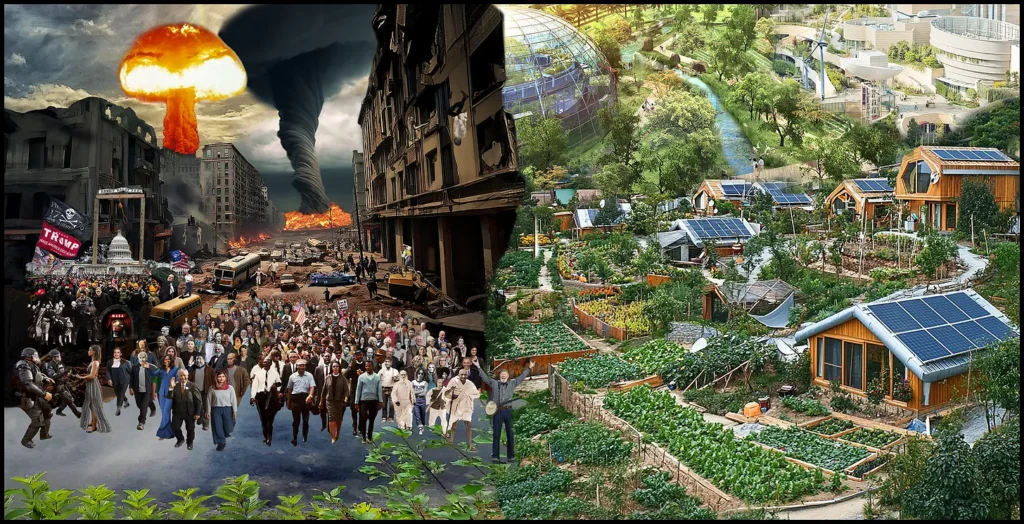Opinion: Building Hope in a Time of Darkness

I created this photomontage—a combination of over 100 images—as a visual aid to help me work out the ideas in this essay. To the left: an apocalyptic depiction of America’s present political moment, while in the foreground a throng of social activists, including “great souls,” marches forward with hope and determination. To the right: a possible future composed of more locally self-reliant, sustainable, and democratically self-governing cities and communities. Photo: Richard Sclove

I’ve spent much of the past nine months in deep distress—mourning all that’s being destroyed, dreading what might come next, grasping for ways to resist.
Yet I’m also haunted by a decades-old book: The Promise of the Coming Dark Age, by historian L.S. Stavrianos. Its Cold War context is dated, but the title still provokes: Can something good arise from the ashes of destruction?
I believe it can. But only if we start thinking—and acting—with far more imagination than we’ve shown so far. And in that “we” I include the resistance movement, the anti-Trump punditry, and the Democratic Party.
As Trump’s assault on the old drives America into darkness, many Democratic politicians seem preoccupied with consultant-curated strategies for restoring the familiar pre-MAGA institutional order.
But restoration may be the wrong goal. That’s the rueful lesson Polish democrats are drawing from their nation’s recent shift in political sentiment back toward authoritarianism:
Democrats elsewhere should heed our mistakes: Offer a positive forward-looking message, not mere restoration” (emphasis added).
Even if Democrats’ dream scenario—retaking the House in 2026 and the Senate and presidency in 2028—were to come true, the world we have known isn’t coming back. An essay in the Atlantic explains:
“It takes only 20 minutes to dismiss 1,300 State Department employees; their expertise cannot be replaced in 20 years, much less a single presidential term. . . . What Trump and the Supreme Court have created is a ratchet of destruction. They have discovered that knocking things down is far easier than building them.”
Then there are the nightmare scenarios. Republicans might rig future elections. Trump could consolidate an increasingly repressive police state.
Yes, Trump and his cronies are the central villains. But Democrats share blame. Too often they’ve downplayed the ravages of globalization, outsourcing, wage stagnation, and extreme wealth inequality. This, together with media splintering into partisan ecosystems—especially a MAGAverse untethered from reality—has deepened polarization to a degree that will severely impede any stable rebuilding. Democrats can try to rebuild, and the next Republican administration can tear it all back down in a month.
But that raises a question: even if we could restore the pre-MAGA status quo, should that be our highest aspiration? Having spent decades trying to imagine pathways to a better world, I answer: no, we can do better.
Of course, we should strive to restore what has value, including respect for the law, robust civil rights and liberties, progressive taxation, a humane safety net, mutually beneficial international alliances, and more. But surviving a prolonged dark age will require more than a diet of resistance. We also need hope—the inspiration that comes from imagining new possibilities and working toward visions that uplift.
That’s why I want to foster more creative thinking about navigating the descent into darkness—and planting seeds for a better future. In that spirit, I sketch a vision I’ve been working toward for decades, hoping to spark others to think in bolder, more forward-looking terms.
Seeking Paths Through the Darkness
My guiding principle is to:
Strive for equal and ample opportunities for everyone to realize their full psychological and spiritual potential.
I’ve mapped out some practical parameters of such a society in a pair of award-winning books. Here, I focus on actions that can be pursued at the local level—steps communities can take starting now. Neither inherently left nor right, such measures would help bridge partisan divides and hedge against national systems that may soon start to fail us. What once seemed utopian could quickly become the most practical path forward:
- More Local Self-Reliance: We could start to shift away from full-throttle globalization toward more diversified, sustainable, and self-reliant local economies. For centuries, global capitalism has inflicted trauma and warped psychological development, fueling widespread social harm and existential threats. Trump’s tariffs disrupt the world economic order via top-down fiat without offering any viable path out of the ensuing chaos. We need the opposite: bottom-up strategies to buffer communities against both market turbulence and authoritarian repression.
- Stronger, More Decentralized Democracy: More localized economies and infrastructures, including renewable energy and community agriculture, can lay the groundwork for more decentralized, egalitarian, and participatory governance, empowering communities to shape their own destinies.
- More Direct (i.e., Non-Virtual) Human Engagement: We could step back from our screen-saturated lives to rebuild vibrant, face-to-face relationships. This might include more communitarian living, such as co-housing or chosen extended families; sustaining convivial in-person work settings; and establishing more public and private gathering spaces. We should also dial back the spread of technologies—like ATMs and chatbots—that replace personal interaction. Having grown increasingly siloed and parochial, American communities could foster healthier cultural pluralism by creating more opportunities for personal connection across differences. And everyone should have the chance to experience firsthand the solace and sanctity of the natural world.
- More Soulful Work: What if we built a job market that shares burdens equitably and affords abundant opportunities to pursue creative, meaningful, and dignified livelihoods? We could shift work toward “caring, craft, and cultural” occupations. We could focus automation, robotics, and A.I. on reducing dangerous and mind-numbing work and on lowering the cost of strategic essentials like solar collectors and medicines. Meanwhile, we should resist allowing A.I. to displace people from jobs that are fulfilling. William Morris foresaw organizing labor along these lines in his 1890 futuristic novel News From Nowhere:“All work which would be irksome to do by hand is done by immensely improved machinery; and in all work which it is a pleasure to do by hand machinery is done without. There is no difficulty in finding work which suits the special turn of mind of everybody; so that no man is sacrificed to the wants of another.”
Many others have outlined similar visions based on environmental, social, or political considerations, thus complementing my psychospiritual rationale. However, historically such ideas have often been brushed aside as fanciful—cutting too sharply against the grain of political momentum, capital flows, and mainstream assumptions.
But that momentum is now collapsing or being channeled down far darker paths. As democracy morphs into corrupt oligarchy or outright fascism, ideas once dubbed “fringe” may soon become deeply practical, perhaps even a path of least resistance. Reinvigorated localism could, for instance, enable communities to supplement whatever remains of the national safety net by reviving traditions of mutual aid.
Fully realizing this vision would require matching changes at the national and global level (see Escaping Maya’s Palace, chap. 17). But communities don’t have to wait. They can start now, working with resources locally at hand and without waiting for distant authorities’ permission. For practical ideas, see Michael Shuman’s excellent essay here.
I’ve outlined one vision. We need many more so that we can sift through alternative possibilities, energize our resistance with forward-looking inspiration, and begin sowing the seeds for a better world.
Tapping into the Spirit of Great Souls
Visionary policies alone won’t be enough. Surviving a dark age will also mean grappling with darker currents in our collective psyche—the forces that have led decent people to embrace someone as cruel and corrupt as Donald Trump.
In the past, some of that work has fallen to “great souls” like Mahatma Gandhi, Martin Luther King, Jr., and Nelson Mandela—leaders whose souls were big enough to extend compassion to their opponents, while rallying millions to transformation. Abraham Lincoln, near the end of the Civil War, captured the spirit: “Let us strive . . . to bind up the nation’s wounds . . . with malice toward none, with charity for all.”
Whether such figures will rise again to lead on a national stage is uncertain. In a time of social fragmentation, perhaps the needed qualities—love, hope, imagination, strategic vision, moral courage, and wisdom of the soul—will be dispersed through many movements rather than embodied in a single leader. Musicians, following in the feisty footsteps of Woody Guthrie, can help conjure the spirit of solidarity, strength, and hope we’ll need.
As I close, my mind returns to that haunting title: The Promise of the Coming Dark Age. Denying the darkness will not banish it—it will only let it deepen. We need to recognize that something profound has shifted and an authoritarian tidal wave is already upon us. Yet history shows that tides recede, and what matters most is the work we do now to shape what follows.
Next Steps
I invite you to share your own thoughts and visions—whether in a comment below or in the Substack chat linked here. Your ideas matter; they may be seeds for what comes next.
I am considering organizing an email discussion list or perhaps a hybrid seminar (online and in-person in Amherst, MA) on the theme “Building Hope in a Time of Morbid Symptoms.” This will be a learning-together enterprise, but it might also become an incubator for follow-on projects and activism. If you’re interested in participating, please message me here, including a few sentences about why you’d like to join.
Richard Sclove is a resident of Amherst ands the author of Escaping Maya’s Palace: Decoding an Ancient Myth to Heal the Hidden Madness of Modern Civilization. Follow him on Substack.
Note: An abridged version of this Substack post has been distributed nationwide by OtherWords news service and picked up by CounterPunch and LA Progressive among other outlets.
Reading Ideas and Interviews that May Stir the Imagination About “Building Hope in a Time of Morbid Symptoms”
André Bächtiger & John S. Dryzek, Deliberative Democracy for Diabolical Times
David Brooks, “The Nuclear Family was a Mistake”
“Pete Buttigieg on Rebuilding America After Trump,” New York Times
Steven Charleston We Survived the End of the World: Lessons from Native America on Apocalypse and Hope
Penny Gill, What in the World Is Going On?: Wisdom Teachings for Our Time
Chellis Glendinning, My Name is Chellis and I’m in Recovery from Western Civilization
Tim Jackson, Prosperity Without Growth: Foundations for the Economy of Tomorrow
Ezra Klein & Derek Thompson, Abundance. (Their argument that it’s become too hard to get things done merits consideration. But they are strangely insensitive to the downsides of global capitalism and techno-utopianism.)
Helena Norberg-Hodge, Local is our Future: Steps to an Economics of Happiness
Barbara Peterson, “Why Building Inspiring Alternatives Is Necessary to Counter Authoritarianism”
Robert D. Putnam, The Upswing: How America Came Together a Century Ago and How We Can Do It Again
Richard Sclove, Escaping Maya’s Palace: Decoding an Ancient Myth to Heal the Hidden Madness of Modern Civilization
Michael Shuman, “The Best Response to Tariff Wars? Declare Economic Independence”
Gabor Maté, “Dr. Gabor Maté on Trauma, Addiction, and Illness under Capitalism”
George R. Stewart, Earth Abides
Rick Wilson, “Why We Need a Solidarity Economy Now”
